For The Latest Medical News, Health News, Research News, COVID-19 News, Pharma News, Glaucoma News, Diabetes News, Herb News, Phytochemical News, Thailand Cannabis News, Cancer News, Doctor News, Thailand Hospital News, Oral Cancer News, Thailand Doctors
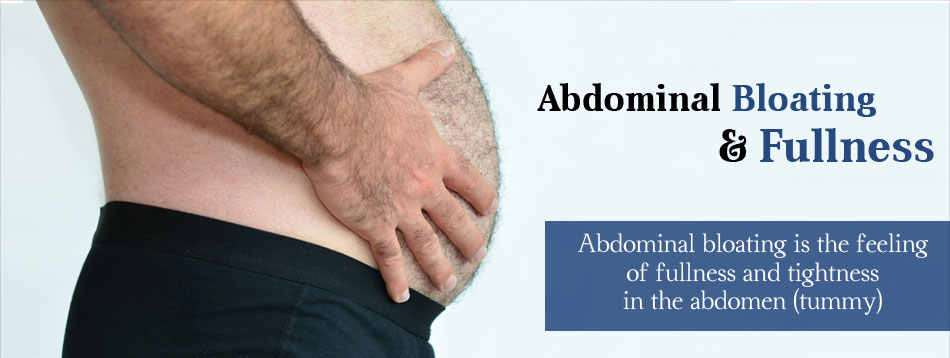
Certain food like broccoli, beans, onions, cabbage, cauliflower, brussels sprouts, lettuce, apples, pears, peaches, milk, pulses, chewing gum, carbonated drinks and whole grain foods can cause bloating. The patient may give a history of excessive intake of these foods. The bloating reduces if the specific food causing it is avoided.
Foods that contain FODMAPs (Fermentable Oligosaccharides Disaccharides and Polyols) are not fully digested before they reach the colon. The bacteria in the colon ferment them to produce gas and can lead to bloating.
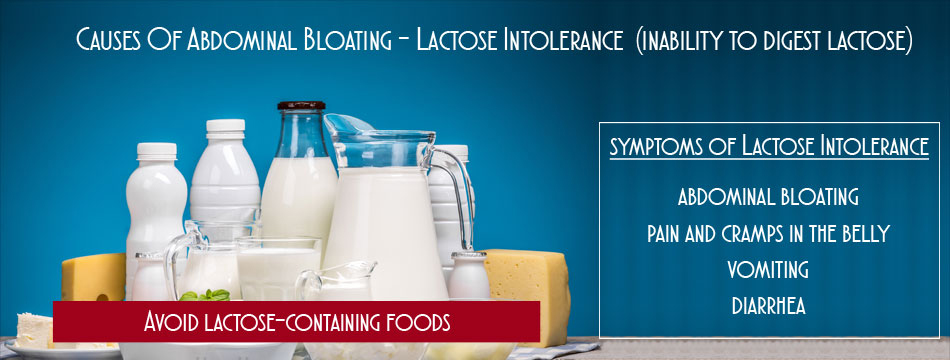
is the inability to digest lactose, a sugar present in milk and its products. It occurs when the small intestines fail to produce enough amounts of lactase, an enzyme which digests the lactose. The symptoms in lactose intolerance include bloating, pain and cramps in the belly, vomiting and diarrhea following intake of milk and milk products. Avoiding lactose-containing foods is recommended to prevent the discomfort. That are many
it-print-color-adjust:exact; background-color:rgb(255, 255, 102); border-radius:3px; box-shadow:rgb(229, 229, 229) 1px 1px; color:rgb(0, 0, 0); font-style:inherit; padding:1px">Thailand healthcare facilities that can conduct lactose intolerance tests for individuals.
is a chronic functional gastrointestinal disorder. The patients with IBS may have abdominal pain, bloating, mucous in stool, and diarrhea or constipation. In patients with IBS, avoiding the foods which trigger the symptoms is recommended. Since there is a psychological aspect to IBS, patients may benefit with techniques to reduce stress.
Intestinal obstruction is a condition where there is a blockage in the lumen of the intestines which prevents the flow of the intestinal contents. Causes of intestinal obstruction include roundworms, severe constipation, colon cancer and intussusception (where one part of the intestine telescopes into another). The patient may present with pain in the abdomen, constipation, vomiting, abdominal distension and bloating. Intestinal obstruction has to be managed immediately to prevent complications.
Gastroparesis is a disorder where the movement of the food is slowed down or stopped from the stomach to the intestine. It occurs due to damage to the vagus nerve that supplies to the stomach muscle and causes it to contract. Diabetes neuropathy affecting the vagus nerve is a common cause of gastroparesis. Bloating is present in these patients.
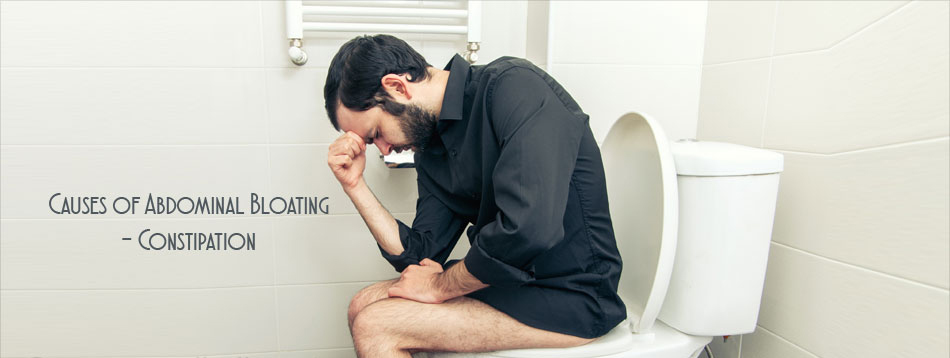
In patients with chronic constipation, bloating may be present due to the retention of stools in the large intestine, which gets fermented by bacteria to release gas. The patient usually gives a history of constipation.
is an autoimmune disease of the intestine with a genetic predisposition. The patients with celiac disease cannot digest gluten, a protein present in foods made of grains like wheat, barley and rye. Consuming gluten causes various gastrointestinal symptoms including bloating. Patients should be advised strict dietary restriction of gluten.
Cirrhosis is a condition where the function of the liver deteriorates due to a chronic liver disease like alcoholism. Bloating is seen in these patients due to the accumulation of the fluid in the abdomen, a condition called ascites. The patients usually give a history of an underlying liver disease.
is a condition where the pumping action of the heart is lesser than the normal. Bloating in these patients is due to the accumulation of fluid in the abdomen, which may occur at a later stage. The patient shows other signs of heart failure like swelling of feet and shortness of breath.
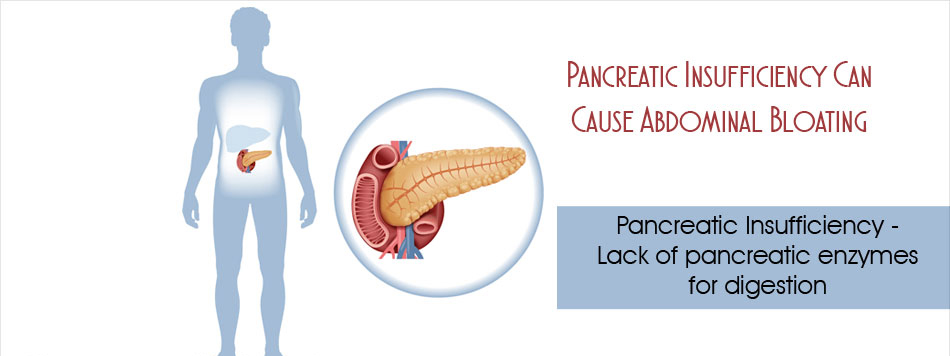
The pancreas secretes digestive enzymes. So in patients with pancreatic insufficiency, the enzymes produced are not sufficient for the digestion of the food. The patients present with pain in the abdomen, bloating and oily stools.
Kidney diseases can lead to a kidney failure. Kidney failure causes fluid retention in the abdomen which can cause bloating.
Increased levels of progesterone during the early pregnancy leads to the relaxation of the intestine which in turn can result in bloating.
A decreased level of thyroid hormones is called hypothyroidism. In patients with hypothyroidism, constipation and bloating are common due to the slow gut movement. Hypothyroidism is diagnosed through blood tests.
Newborns and infants often have the bloating problem since they swallow a lot of air while suckling. Proper feeding technique and burping are necessary to prevent gas in babies.
is experienced due to the hormonal variations for 1-2 weeks just before menstruation. The bloating is due to high estrogen level leading to water retention. The bloating decreases after menstruation.
Bloating is presentin patients with gastric surgeries like fundoplication due to gas accumulation in the stomach. Gastric banding and other bariatric procedures can also cause bloating. The patient gives a prior history of surgery.
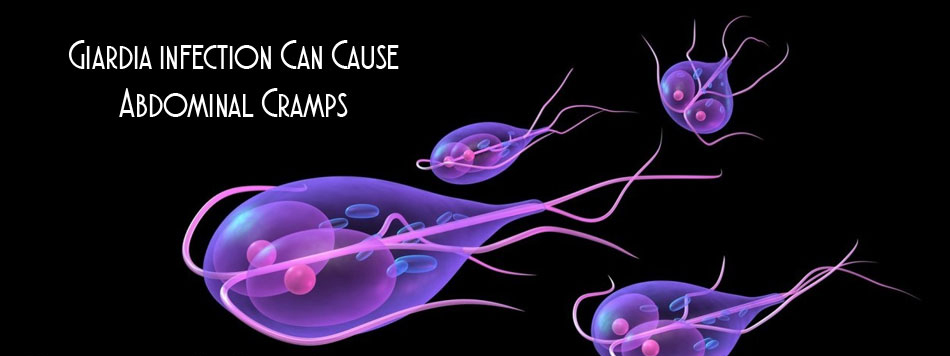
can cause bloating in the patients along with watery diarrhea and abdominal cramps. It can be diagnosed through repeated stool tests.
Small intestinal bacterial overgrowth (SIBO) is a condition where the normal intestinal bacteria overgrow. It can cause the gastrointestinal symptoms like nausea, diarrhea and symptoms related to abdominal bloating.
Cancers of the stomach, intestine and ovaries can cause bloating. These have to be ruled out in patients complaining of persistent bloating.
Consuming peppermint may help to reduce the symptoms of abdominal bloating.
-Bloating can usually be safely treated at home. Some options that may help include:
over-the-counter medications, including antacids or bismuth salicylate (Pepto-Bismol)
-applying a heat pad to the stomach
-drinking water
-eating peppermint
-drinking carbonated water
-taking a laxative to relieve constipation
Keeping a food diary to monitor bloating can also be useful. This can help with diagnosing food intolerances and making healthy lifestyle changes. Many people find that simply avoiding certain foods can prevent bloating and other gastrointestinal health issues.
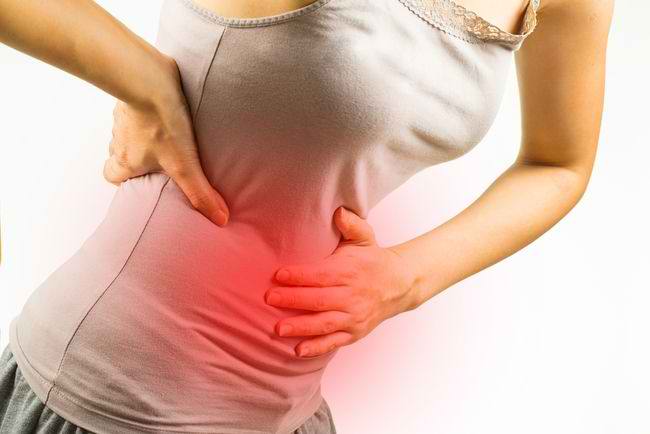
Rarely, bloating could be a sign of something more serious. A person should see a doctor for bloating associated with:
-intense pain
-a fever
-vomiting lasts longer than 24 hours, or if it is impossible to keep any food down
-bloody stools
-a physical injury, such as a punch to the stomach or a car accident
-rapid swelling of the abdomen or anywhere else in the body
-surgery
-liver or kidney failure
Abdominal bloating can be disconcerting and painful. For most people, the cause can be treated at home and will be something simple. A person should speak to a doctor if the symptoms get worse or do not go away after a few days. Short term episodes that come and go are also a sign to see a doctor and to do a full medical checkup. Thailand Medical News recommends that even if the symptoms eases, do not take the risk but rather do a full medical checkup and consult a good gastroenterologists.There are many good Thailadn Hospitals that have a excellent gastroenterology departments.
Abdominal bloating - (https://medlineplus.gov/ency/article/003123.htm)
Bloating, belching and intestinal gas: How to avoid them - (https://www.mayoclinic.org/diseases-conditions/gas-and-gas-pains/in-depth/gas-and-gas-pains/art-20044739)
Schmulson, M. and L. Chang, Review article: the treatment of functional abdominal bloating and distension. Alimentary Pharmacology & Therapeutics, 2011. 33(10): p. 1071-1086.
Dukowicz, A. C., Lacy, B. E., & Levine, G. M. (2007). Small Intestinal Bacterial Overgrowth: A Comprehensive Review. Gastroenterology & Hepatology, 3(2), 112–122.
Therapeutic Approach for Irritable Bowel Syndrome: Old and New Strategies. - Published by PubMed
Blastocystis sp., parasite associated with gastrointestinal disorders: An overview of its pathogenesis, immune modulation and therapeutic strategies. - Published by PubMed
Primary Prophylaxis to Prevent the Development of Hepatic Encephalopathy in Cirrhotic Patients with Acute Variceal Bleeding. - Published by PubMed
Abdominal distension in health and irritable bowel syndrome: The effect of bladder filling. - Published by PubMed
Systematic review and meta-analysis: Efficacy of patented probiotic, VSL#3, in irritable bowel syndrome. - Published by PubMed